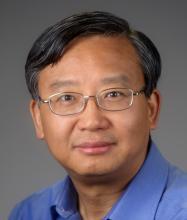
Dr. Kevin Chen obtained his medical degree from Sichuan Medical College of Sichuan University. He finished his residence (in 1985) and Oral and Head-Neck Surgery training (in 1988), respectively, in the Second Affiliated Hospital and the Faculty of Stomatology, Xian Jiao-Tong University.
From 1992 to 1993, he was a visiting Clinical Fellow (with Dr. Willard E. Fee Jr.) in the Division of Otolaryngology and Head Neck Surgery at Stanford University School of Medicine. He began his research on cancer genetics and drug resistance with Dr. Branimir Sikic at Stanford in 1993 and received his Ph.D. degree in the Program of Cancer Biology at Stanford in 2002. He continued studying drug resistance mechanisms in human cancer (with Dr. Michael Gottesman) as a postdoctoral Research Fellow at the National Cancer Institute. In 2005, he joined the NIH Stem Cell Unit directed by Dr. Ronald McKay (2005-2010) and Dr. Pamela Robey (2011-present). Dr. Chen was appointed as Adjunct Associate Professor of Georgetown University in 2010, Staff Scientist at the NINDS in 2011, and Associate Scientist in 2024.
He has authored or co-authored 1 patent, 47 abstracts, and 62 articles in peer-reviewed journals, books, and preprints. He received several awards from cancer and stem cell research. Currently, Dr. Chen is using pluripotent stem cells to model various neuronal and vascular diseases in vitro for drug discovery and to optimize neuroectodermal and mesoendodermal differentiation in cell culture platforms for regenerative medicine.
Research Interests:
Dr. Chen is interested in deciphering the cellular codes that underlie the complexities of human diseases such as cancer, hematopoietic diseases, and neurological disorders. His current research focuses on characterizing pluripotent and adult stem cells, aiming to identify optimal signaling cascades that precisely control diverse pluripotent and differentiated cellular states in vivo and in vitro. Using pluripotent stem cells as a tool, he is modeling various neuronal and vascular diseases and demystifying the growth control and differentiation trajectories of the neuroectoderm. He is also unraveling genetic and biochemical pathways that regulate the genome stability of stem cells and the central nervous system (CNS). His research interests aim to accelerate drug discovery and the implementation of precision regenerative medicine.
Selected Publications:
[*corresponding author(s)]
Chen KG*, Park K, Maric D, Johnson KR, Robey PG, Mallon BS*. Metabolic quadrivalency in RSeT human embryonic stem cells. Reprint at bioRxiv, doi: https://doi.org/10.1101/2024.02.21.581486 (2024).
Chen KG*, Park K, Spence JR. Studying SARS-CoV-2 infectivity and therapeutic responses with complex organoids (Review). Nature Cell Biology 23, 822–833, 2021.
Johnson KR*, Mallon BS, Fann YC, Chen KG*. Multivariate meta-analysis reveals global transcriptomic signatures underlying distinct human naive-like pluripotent states. PLoS One 16(5): e0251461. doi: 10.1371/journal.pone.0251461. 2021.
Chen KG*, Zhong P, Zheng W, and Beekman J. Pharmacological analysis of CFTR mutations by stem-cell derived organoid assays (Review). Drug Discovery Today 24(11): 2126-2138, 2019.
Chen KG*, Mallon BS, Park K, McKay RD, and Robey PG, Gottesman MM, Zheng W. Pluripotent stem-cell platforms for drug discovery (Review). Trends in Molecular Medicine 24(9): 805-820, 2018.
Chen KG*, Kory R. Johnson, McKay RD, and Robey PG*. Conceptualizing Paralogous Stem Cell Niches and Unfolding Bone Marrow Progenitor Cell Identities (Review). Stem Cells 36(1):11-21, 2018.
Chen KG*, Mallon BS, McKay RD, and Robey PG. Human pluripotent stem cell culture: considerations for maintenance, expansion, and therapeutics (Review). Cell Stem Cell 14; 13-26, 2014.
Chen KG and Sikic BI*. Molecular Pathways: Regulation and therapeutic implications of multidrug resistance. (Invited Review). Clinical Cancer Research 18: 1863-1869, 2012.
Chen KG, Leapman RD Zhang G, Lai B, Valencia JC, Cardarelli CO, Vieira WD, Hearing VJ, and Gottesman MM*. Influence of melanosome dynamics on melanoma drug sensitivity. The Journal of the National Cancer Institute 101: 1259-1271, 2009.
Adewumi O, Aflatoonian B, Ahrlund-Richter L, Amit M, Andrews PW*, Beighton G, Bello PA, Benvenisty N, Berry LS, Bevan S, Blum B, Brooking J, Chen KG, et al. Characterization of human embryonic stem cell lines by the International Stem Cell Initiative. Nature Biotechnology 25: 803-816, 2007.
Chen KG, Valencia JC, Lai B, Zhang GF, Paterson J, Rouzaud F, Berens W, Wincovitch SM, Garfield SH, Leapman R, Hearing VJ, and Gottesman MM*. Melanosomal sequestration of cytotoxic drugs contributes to the intractability of malignant melanomas. Proceedings of the National Academy of Sciences of the U.S.A. 103: 9903-9907, 2006.
Chen KG*, Wang Y, Schaner ME, Francisco B, Duran GE, Juric D, Huff LM, Padilla-Nash H, Ried T, Fojo T, and Sikic BI. Genetic and molecular modeling of the origins of multidrug resistant cells in a human sarcoma cell line. Cancer Research 65: 9388-9307, 2005.
Chen KG, Lacayo NJ, Duran GE, Cohen D, Sikic BI*. Loss of cyclosporin and azidopine binding are associated with altered ATPase activity by a mutant P-glycoprotein with deleted Phe(335). Molecular Pharmacology 57: 769-777, 2000.
Chen G, Duran GE, Steger KA, Lacayo NJ, Jaffrezou J-P, Dumontet C, and Sikic BI*. Multidrug resistant human sarcoma cells with a mutant P-glycoprotein, altered phenotype, and resistance to cyclosporins. Journal of Biological Chemistry 272: 5974-5892, 1997.
Beketic-Oreskovic L, Duran GE, Chen KG, Dumontet C, and Sikic BI*. Decreased mutation rate for cellular resistance to doxorubicin and suppression of mdr1 gene activation by the cyclosporin PSC 833. Journal of the National Cancer Institute 87: 1593-1602, 1995.
Chen KG, Jaffrezou J-P, Fleming WH, Duran GE, and Sikic BI*. Prevalence of multidrug resistance related to activation of the mdr1 gene in human sarcoma mutants derived by single-step doxorubicin selection. Cancer Research 54: 4980-4988, 1994.
Jaffrézou J-P, Chen KG, Duran GE, Kuhl J-S, and Sikic BI*. Mutation rates and mechanisms of resistance to etoposide determined from fluctuation analysis. Journal of the National Cancer Institute 86: 1152-1158, 1994.
